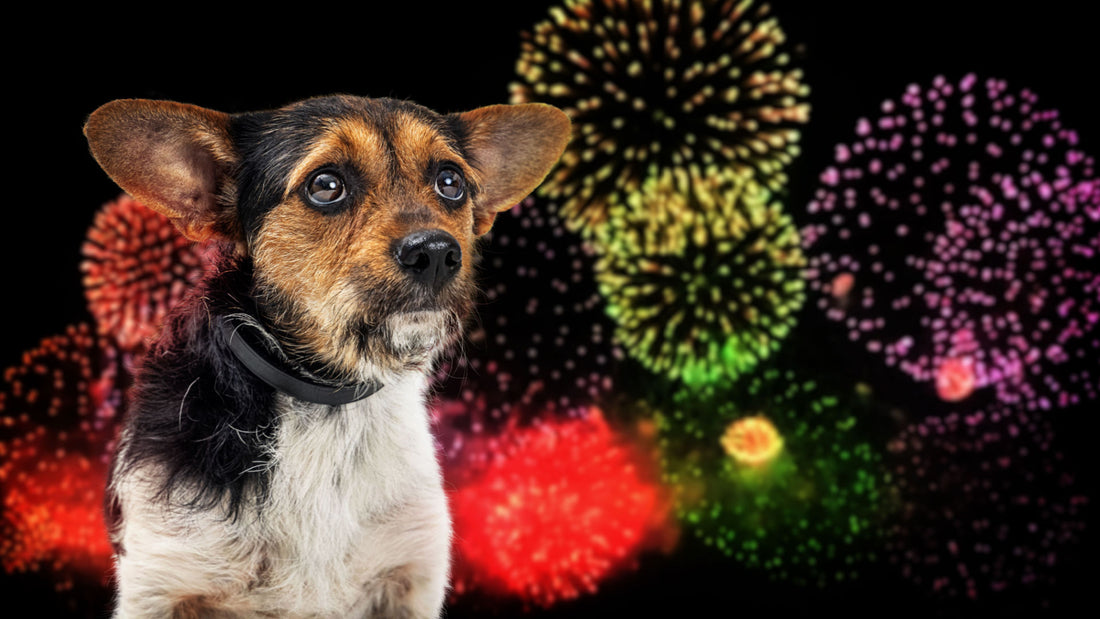
Dogs, Cats, and Fireworks: How to Prepare
The Fourth of July sparks excitement with its vibrant fireworks displays and jubilant celebrations. But for our cherished pets, the loud and unpredictable bangs of fireworks can ignite distress and anxiety. The trio of dogs, cats, and fireworks can often create a stressful ensemble.
As dedicated pet parents, our role is to ensure our pets feel secure during these potentially frightening festivities. This blog will explore why the sounds of fireworks can terrify pets and offer insights on calming your four-legged family members amidst the celebratory chaos.
Fireworks Through Your Pet’s Ears

The thunderous roars and brilliant flashes of fireworks can incite fear and anxiety in our pets. Dogs and cats possess keen hearing senses, detecting sounds at far higher frequencies than humans.
Unexpected, loud noises from fireworks can startle and overwhelm them, leading to severe cat and dog anxiety and stress. It's crucial to understand that our furry friends genuinely perceive the racket as a threat, reacting in kind.
Spotting Signs of Fear in Pets
The uproar of fireworks can trigger stress in pets, making them feel threatened. This activates the "fight or flight" response and can lead to a slew of behavioral problems, such as:
- Shaking or trembling
- Heavy panting
- Restless pacing
- Seeking refuge in hidden spaces
- Indoor “accidents”
- Excessive barking or whining

In extreme cases, the stress of fireworks can even lead to physical health problems like:
- Rapid heart rate
- High blood pressure
- Nausea or vomiting
- Diarrhea
- Seizures
Related Reading: How to Stop Your Dog from Barking
The Dangers of Fireworks Season for Pets
With the above information in mind, it’s no wonder why the Fourth of July is known to be one of the most dangerous holidays for our beloved cats and dogs.
Reactions to fireworks can lead to disastrous outcomes – pets may flee, conceal themselves in unsafe places, or even get injured trying to escape the noise. To prevent such occurrences, proactive safety measures are vital to keep our pets secure during these noisy celebrations.
Protecting Your Pet from Fireworks
Don't wait until the fireworks start to protect your pet. Here are some preemptive tips:
- Keep your pet indoors. This will help to protect them from the noise and commotion of fireworks.
- Close all windows and doors. This will help to muffle the sound of fireworks and keep your pet from being startled by sudden noises.
- Play calming music or white noise. If you’re struggling with how to block out firework noise for dogs, try this tip.
- Offer your pet a safe place to hide. This could be a crate, a closet, or even under a bed.
- Provide your pet with plenty of water. Stress can make animals dehydrated, so it’s important to make sure they have plenty of fluids.
- Consult with your vet about emotional support supplements, such as Calming Aids. These are especially helpful if your pet displays physical signs of distress, such as shaking or panting.
- Acclimate your pet to firework sounds early. This can be done by playing recordings of fireworks at a low volume, increasing gradually.
- Train your pet to respond to calming cues like "sit" or "stay." This will help them to feel more in control and less anxious.
- Praise your pet for staying calm during firework sounds. This will help them to associate fireworks with positive experiences.
Tips to Help Calm Your Pet During Fireworks:
1. Create a Safe Space:

Set up a designated area in your home where your pet feels safe and comfortable. This can be a quiet room with their bed, toys, and familiar scents. Try covering their crate with a blanket. Or consider buying a calming blanket or vest, which can provide a sense of security by applying gentle pressure to the body.
Related Reading: How to Crate Train a Puppy
2. Block Out the Noise:
During fireworks displays, minimize loud noises by closing windows and drawing curtains. Playing soft, calming music or turning on a white noise machine can also help create a soothing environment.
3. Provide Distractions:

Engage your pet in activities that divert their attention from the fireworks. Puzzle toys, treat-dispensing toys, or interactive play sessions can help redirect their focus and alleviate anxiety.
4. Stay Calm and Reassuring:
Our pets look to us for guidance and reassurance. Stay calm and maintain a positive demeanor to help them feel secure. Avoid scolding or punishing your pet if they display fear or anxiety, as this can worsen their distress.
5. Create a Safe Outdoor Environment:
If you need to take your dog outside during fireworks, make sure they are leashed and wearing a collar with ID. This will prevent them from running away if they become frightened. Consider taking them for a walk earlier in the day to tire them out and reduce their anxiety levels.
Related Reading: Paw Protection for Dogs
6. Consult with a Professional:
If your pet is still struggling to cope with fireworks, you may want to consider working with a certified animal behaviorist. They can help you develop a personalized plan to help your pet overcome their fear of fireworks.
Prioritize Pet Safety This Fourth of July

As pet parents, we bear the responsibility of ensuring our furry family's safety and well-being. By preparing a safe space, minimizing noise, providing distractions, and offering comfort during firework events, we can shield them from anxiety.
With your proactive approach and these simple steps, you can make a significant difference in your pet's well-being.
Here's to a safe and joy-filled Fourth of July for you and your furry companions!
JOIN OUR PACK
Follow us @NaturVet on social media to fill us in on any information we might have missed, and explore all of NaturVet.com for the latest in pet wellness. We’ll fill you in on our favorite resources, supplements, tips and tricks, and more – everything you need to be the best pet parent possible.






